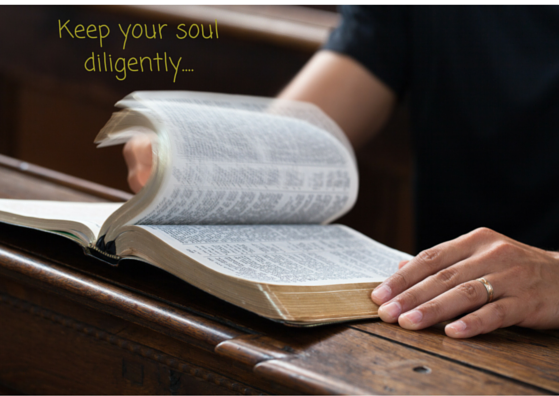It’s easy to forget.
It shouldn’t be. It’s even wrong, that we forget. But it seems to happen so subtly, so quietly, that we don’t even realize that we are forgetting.
There are moments–seasons, if you will–in our lives, when God’s presence is so evident. Palpable, even. We sense His nearness; and we see very tangible pieces of what He is actively doing. And sometimes we deceive ourselves into thinking that we will always remember how God “did this”. Or how God “moved in that way.” We think we will always recall how we knew, beyond any shadow of a doubt, that He was near.
But then, sometimes, we forget. And, sometimes in those moments of forgetting, we worry—where has He gone? And, maybe just a bit, we worry. We become unsettled, in both our minds and our souls.
God knew this about our human nature. He was, after all, the one who created us with these tendencies. These leanings toward forgetting, and toward unsettledness of mind and soul. He knows this about us, today, and He knew it about the Israelites as they as Moses prepared them for his death, and for their entrance into the promised land–after 40 years of wandering in the wilderness.I came across this verse yesterday, and it nearly stopped me in my tracks. Surely I have read this verse dozens of times before. Dozens and dozens. But never has it struck me like it did yesterday, sitting in my usual, predictable seat on a Sunday morning. In fact, I didn’t hear much of the sermon–which, by the way, was on Titus, and not on scripture in Deuteronomy:
“…..lest you forget the things that your eyes have seen, and lest they depart from your heart….” He knew. God knew that, just as time has a way of dulling the sharp edges of grief, time also has a way of causing us to forget the things that our eyes have seen–those moments when we knew that God saw, knew and acted. Those times when, in the throes of despair, we felt His comfort and His peace. Or, in the times of tremendous joy, we felt overwhelming gratitude for what we knew were blessings straight from His hand. Or, those times in which we knew that, what we were witnessing His unmistakable hand–in the salvation of a dear friend, the provision of a deep need, the miraculous answer to a long-prayed-for-prayer, and oh, so many other ways that we have seen Him act.
Just as the Israelites saw His wrathful hand rescue them from the pursuing Egyptians as He parted the sea for their crossing, and then thundered it down upon their enemies after their safe arrival to the other side. Or just as they saw His leading by a pillar of fire at night, and a pillar of cloud by day. And how He provided their physical needs through manna, and quail, and water from rocks.
He knew that we, as sinful people–as human people–forget. We become enamored by shiny things. We become wrapped up in “the next thing”–the next job promotion, the next church to call us to serve on staff, the next crises to endure.
Or–and maybe this is worse–we become complacent. Our days become ordinary–which, isn’t necessarily a bad thing–but sometimes we “forget the things that {our} eyes have seen…” in the very sameness of our routine days.
And we wonder where God has gone. Or, worst yet, we wonder if maybe what we saw in the past, was not actually Him.
I know these thoughts, too, too well, in my own soul and mind.
He knew this about the Israelites, and He knows this about us, today, so many years later. And he warns us.
He warns us to take care. He warns us to keep our soul diligently.
And then He reminded the Israelites, of what He had done; in this case, in the giving of the ten commandments to the people, as they stood at the base of the mountain and witnessed His holiness in a very visible and tangible way.
But, how are we to “take care”? How are we to “keep our soul diligently”?
I’m not entirely sure, honestly. But I wonder if it doesn’t come down to diligently approaching Him day after day after day, regardless of whether we “sense” His presence or not. Regardless of whether we “feel” like pursuing Him in earnest and real prayer, and the reading of scripture, and the act of worship–or not. I wonder if it doesn’t come down to that word “diligent”: to me, that word conjures up in my mind the view of someone approaching something with disciplined care and attention to it; consistently.
Not just when they feel like it. And, maybe, not just when there is joy to celebrate. Or despair to seek comfort from.
And, maybe when we take care, and when we keep our soul diligently, through the steady practice of spiritual disciplines of prayer, and scripture study/reading, and corporate and private worship, we are more apt to remember–not just what God has done for us–but who He is.
And then, when we come together to observe communion, and we read the words in Luke–“Do this in remembrance of Me”–we will be more aware and able to say
–regardless of whether we are in that moment, experiencing immense joy, or gut-wrenching grief, or day-in/day-out ordinariness of life–
You are my Lord. And my God. And I remember. And will remember.
And my soul is, and will be, well.
The Holy Bible: English Standard Version. (2001). (Dt 4:9). Wheaton: Standard Bible Society.


